September 11th is National Preparedness Month, but don’t wait! I feel like NOW is the best time to share the easy ways I’ve found to build up home food storage for long-term use!
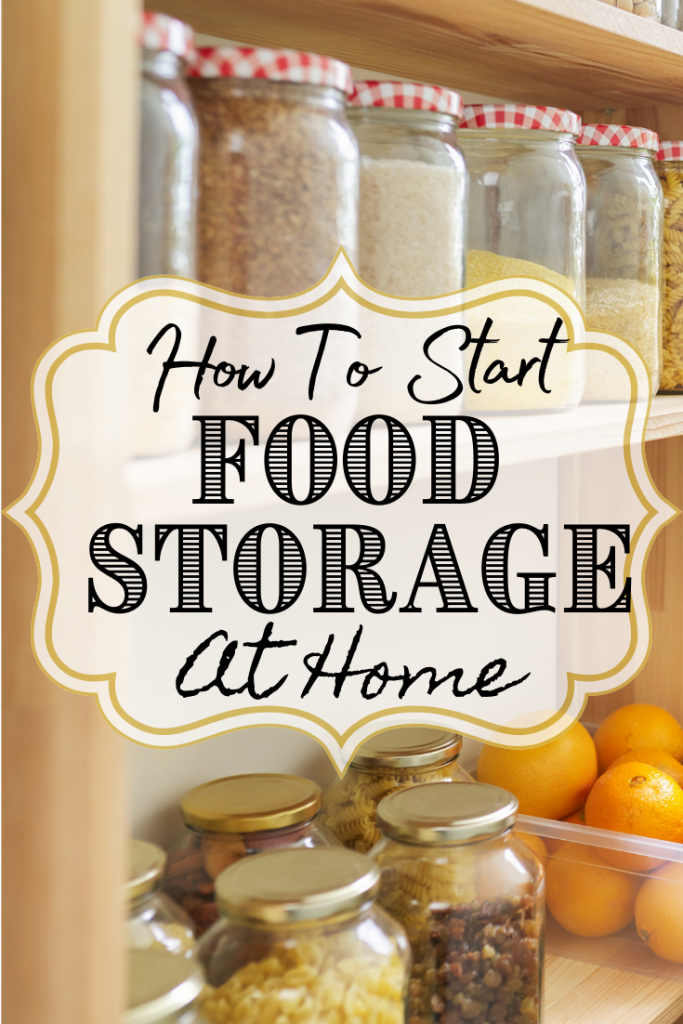
Why Home Food Storage Is A Good Idea
We live in an interesting time! There is so much good to be had: technology, education, an abundance of resources, excellent communication, and inspiring travel opportunities… However, we also have a lot of challenges, like natural disasters, global pandemics & illnesses, earthquakes, hurricanes, tornados, snow apocalypse, wars, terrorists, and vehicular accidents (like no other time on earth!).
There are so many things going on around the world that cause commotion and emotion, but we can limit their effects on our homes and families by preparing! I believe a universal law that always applies is, If you are prepared, you will not fear. That applies to every part of life that I know of… Think about it! Education, Carriers, any competition, playing an instrument, any sort of performance, cooking, cleaning, gardening, raising children, and on and on!
A good reason –

We’ve all learned a little bit about food and supply shortages in the united states over the last year! Local grocery store shelves have been EMPTY, building supply prices soared like gold for a while this year, restaurants closed due to shortages, and on and on. It’s amazing how fast shortages happen during or after a disaster of any kind. For example, Texas has a hurricane or an unprecedented freeze, and gas prices soar.
Home Food Storage, and storage of essential items, are one of the best ways to prepare for uncertain times! Having enough nourishing foods, and essentials, stored at home allows you to avoid stresses (or going without) that come with shortages. Home Food Storage, and other essentials stored at home, also give you the opportunity to help others in need! In my experience, it’s always more satisfying to share with others than to take from others.
(Taking from others can happen innocently in times of shortages!…. For example That last package of toilet paper at Walmart that I snatched up; I bet someone else really needed that too!) It’s just better to be prepared with extra for hard times.
How Much Food Should I Store?
You have enough food when you get a 1 year supply of food for all family members. However, start small! Start with just an emergency food supply of 1-month food storage of a variety of foods your family regularly eats, and work up! I suggest you get an extra freezer for the garage and fill it with foods your family is used to eating! You can usually pick up used freezers or refrigerators for a good deal on Facebook marketplace and craigslist… But the best deals are at garage sales!
Start small, with just a 1 month emergency supply, and work up by picking up a few extras at the store each month! – Juliea
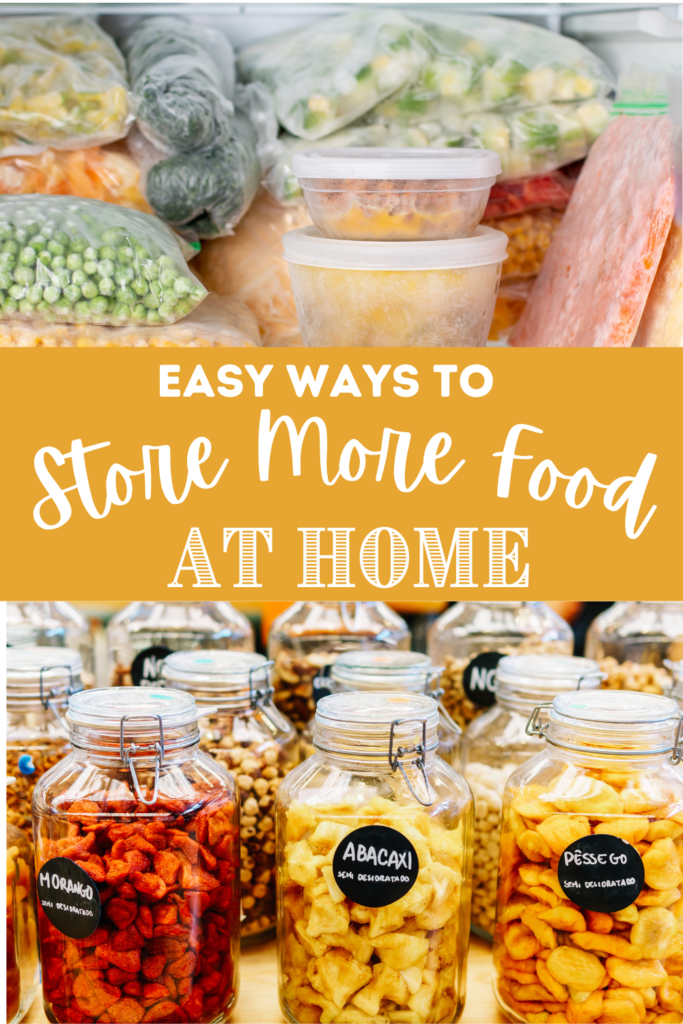
What Foods To Store
I’m showing the easy things you can pick up a few extra containers each time you go to the grocery store, and build long-term food storage. Store main food staples that will nourish your family and friends including Grains, Beans, Pasta, Meats, Vegetables, and Fruits.
Water Storage
Don’t forget how important clean water is! We have a well with a hand pump, but it’s only 26 feet deep, and with all the farming around us, we NEED a good filter. LOVE the BERKY water filter! It filters out the MOST substances including the harmful substance in groundwater from Round-Up! Pretty Important to me.
Where To Store Food
Food keeps longest when stored in a cool dark place. That is why root cellars, and basements storage rooms do so well! I store boxes of canned food under my bed, in closets, and in the garage because I don’t have a basement or root cellar. I also keep meats, vegetables, and fruits in a deep freezer!

Grains & Legumes Pasta Sugar & Honey
Dry grains and legumes are the best way to get long-term food storage items that have a long shelf life in the pantry at room temperature. They’re also filling because a little can go a long way! These are the grains and legumes I have in the pantry, and under beds in bigger containers.
You buy dry rice and beans in plastic bags that last quite a while, and you can transfer them to glass jars, plastic containers or number ten cans with lids. (A number ten can is a large can, like a large coffee can.) One great thing about grains and legumes is that you don’t really have to worry about an expiration date…They last for years!
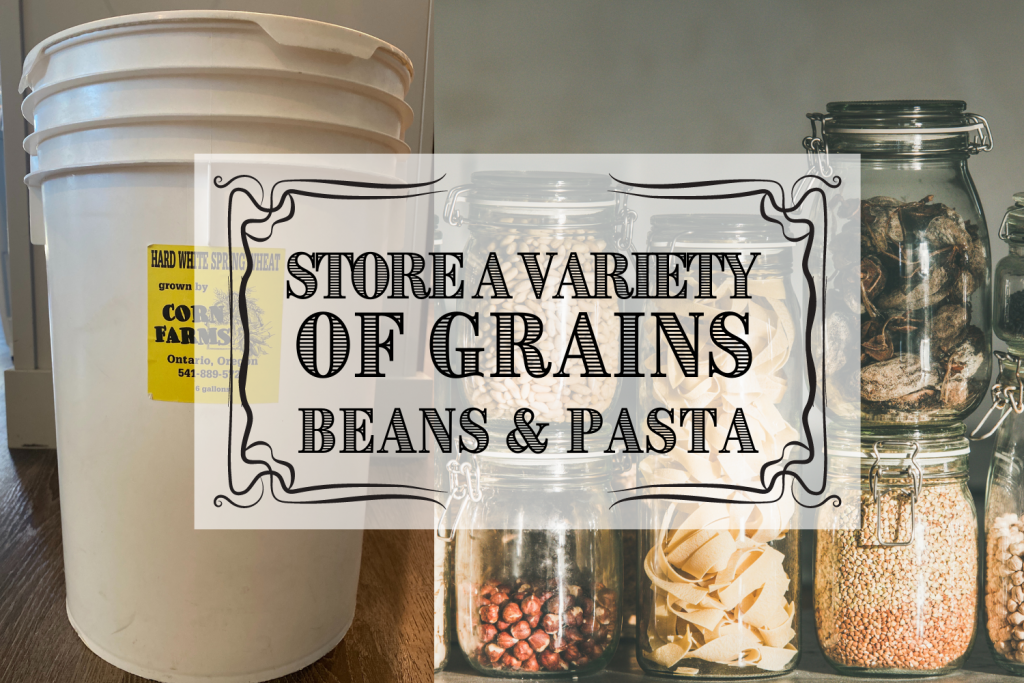
- Wheat (I have a grinder, and sprout it)
- White rice for long-term storage… It’ll last years in large containers.
- Brown rice, I buy the big bag at Costco and keep this in my pantry… My kids actually really like it too!
- Wild Rice – This is more expensive. I have about a quart-sized jar in the pantry and add it to dishes for an extra bang.
- Dried Peas – These also last a long time. I have them in my pantry in a big jar. They’re great for soups!
- Dried Beans – A little dried beans make a big pot of beans! Beans are comforting and satisfying to me, and I love cooking them from dry beans.
- Dry Lentils – Like a bean but smaller.
- Quick and Steel Cut Oats
- Brown Sugar
- White Sugar
- Quarts of Honey
- Pasta
Pasta is a great food storage item… It’s easy to make, cheap and filling! It’s easy to just pick up a few extra boxes during each grocery store visit, and it’s pretty cheap too. I keep a pretty big rectangle basket in the pantry full of my favorite pasta. My family prefers Angel Hair pasta, so we’ve got several boxes of that. Plus we all like pasta salad so we have lots of that too!
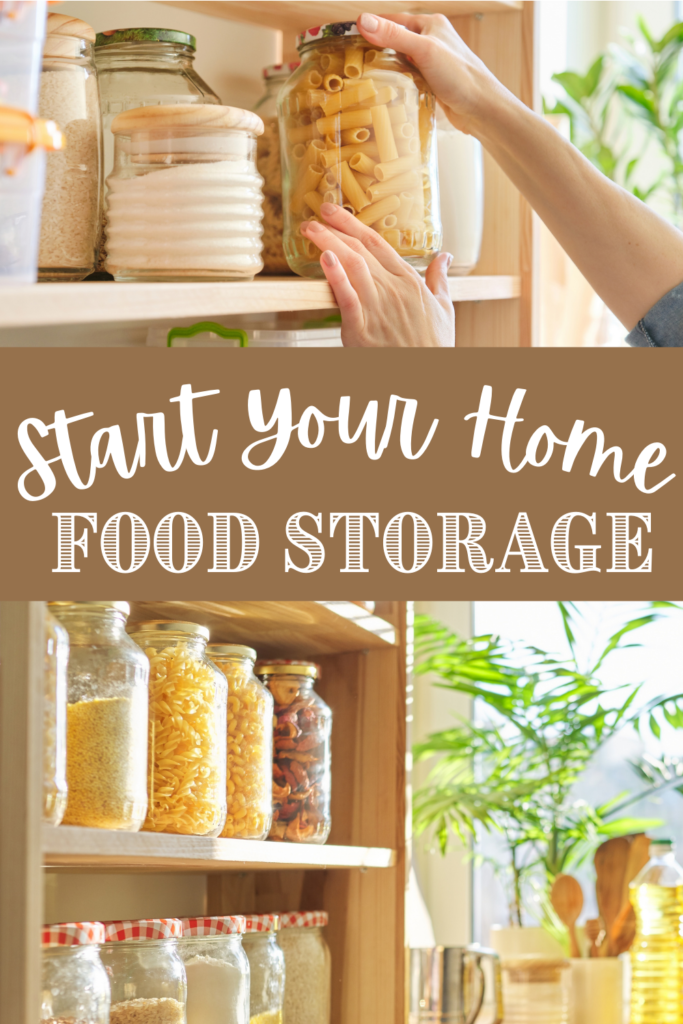
Storing Proteins
(If you only have grains and legumes stored, it’s ok! You can combine grains, like rice and beans, for a complete protein!)
Okay… Now that we are all ready with all the CARBS we will need for a year, let us talk about proteins!
Frozen Meats
My husband is a hunter, and we get to buy half a cow every so often, so we usually have a freezer full of red meat…. To the point that I get tired of red meat and just want fish or chicken, lol! HOWEVER, I know most people don’t get an Elk in the fall, or buy beef by the half cow. There are other great ways to store meat!!!!
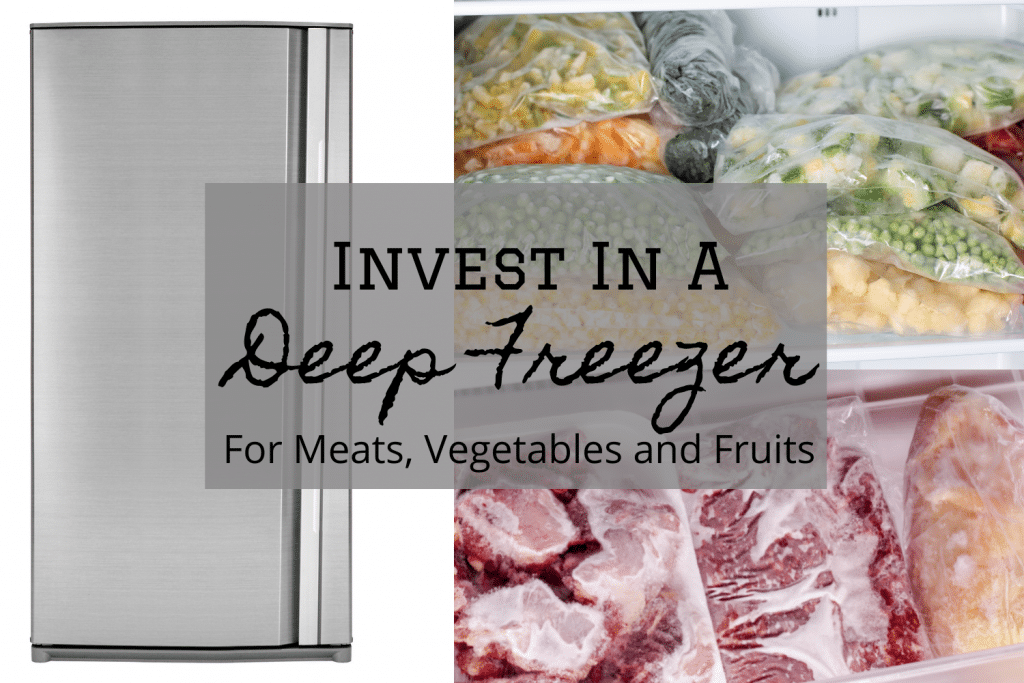
Chickens
Keeping a small flock of chickens is a great way to be prepared, teach kids where food comes from and responsibility! Chickens will keep you in eggs and can provide meat if it ever came to that. EGGS!!! Eggs are a great protein source that you can preserve! You can buy freeze dried or powdered eggs online. Store unwashed *fresh* eggs in a refrigerator for 3 – 6 months. Preserve unwashed FRESH eggs in LIME WATER for up to 1 year! (Here’s How) It’s important to note that you cannot store store-bought or washed eggs these ways, just FRESH from the chicken eggs that are UNWASHED.
Canned Meats
Canned meats are awesome! They are precooked, and can be prepared in no time! You can buy canned meats at the local grocery store, or in bulk at Costco! I’ve also canned chicken, fish, and elk! You have to use a pressure cooker instead of a water bath canner for meats, but you will absolutely LOVE the end product! When you home can meats, you can add your favorite seasonings, and they are so delicious! Just make sure to follow the directions from a trustworthy source for safety! I like the National Center for Food Preservation website!
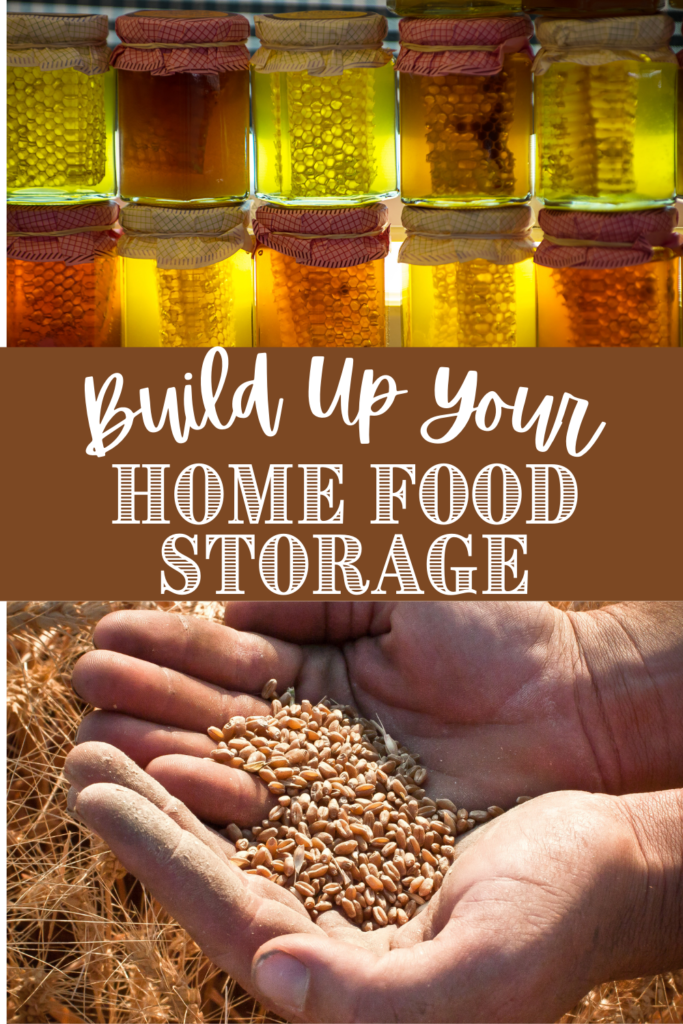
Dehydrated Foods
Dehydrated foods can also be great for protein, like Beef Jerky and Turkey Jerky, and will last a year in their packages… They’re pretty good too! We have also made our own jerky with elk and deer. It’s homemade but drier, and we store it in the refrigerator or freezer. We do enjoy using the smoker to make jerky because the flavor is SO good! Frozen jerky can last years in the freezer in an air-tight container.
Freeze Dried
Meats can be purchased online and at some stores. You can also buy a small freeze dryer and make your own at home. We bought a home freeze dryer from Harvest Right with the mylar bags to package it in. We freeze-dried scrambled eggs, roast beef, pulled pork, leftover spaghetti, and FRUIT! Freeze Dried foods last like 20 years if stored in a cool area!
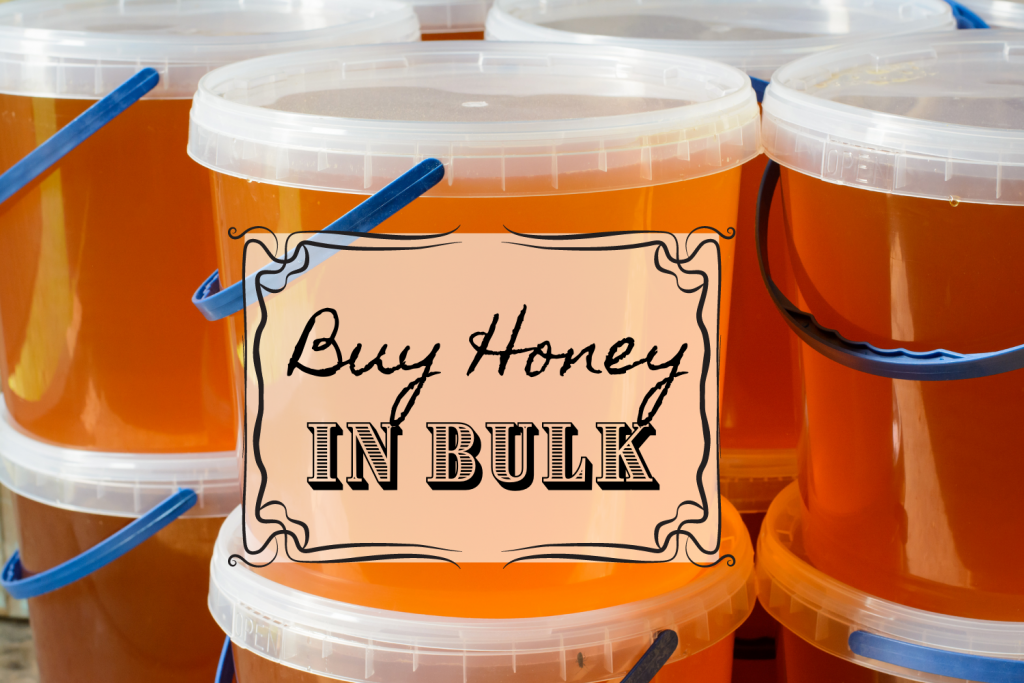
How To Store Fruits & Vegetables
You can store fruits and vegetables in a root cellar, fermented (think sauerkraut and lacto fermented veggies!), canned in jars, freeze dried or dehydrated! For fresh fruits and vegetables, the root cellar is the best option, however, that isn’t always an option. Freeze-dried fruits and vegetables retain their nutrition and last up to 25 years. Home-canned fruits and vegetables are best used within one year but last a few. Dehydrated foods last a year or two when stored in a cool dry place out of direct light.

Root Cellar Storage
Root cellars are best to store food because they’re awesome for storing FRESH fruits and vegetables! Fresh is always best when it comes to nutrition and usage. They aren’t processed. They are easiest to use fresh, as you cook or eat them as usual.
How To Store Fruits
Fruits that can be stored in a root cellar include apples and pears. Pears last 2-3 months in a root cellar or cold room, and apples last 2-7 months depending on the variety! Tart apples last longer than sweet varieties… My favorite apples for long storage are Granny Smith and Pink Lady Apples!
Cabbage does great in a root cellar for 4+ months, just remove outer leaves that go bad, and the inside is perfect. Onions, leeks, and garlic are also stored for long periods of time in a root cellar! Garlic stores for 5-8 months in a root cellar. Onions generally last for 5-8 months, and leaks last up to 4 months in a root cellar! And of course, all root vegetables last the longest in a root cellar!
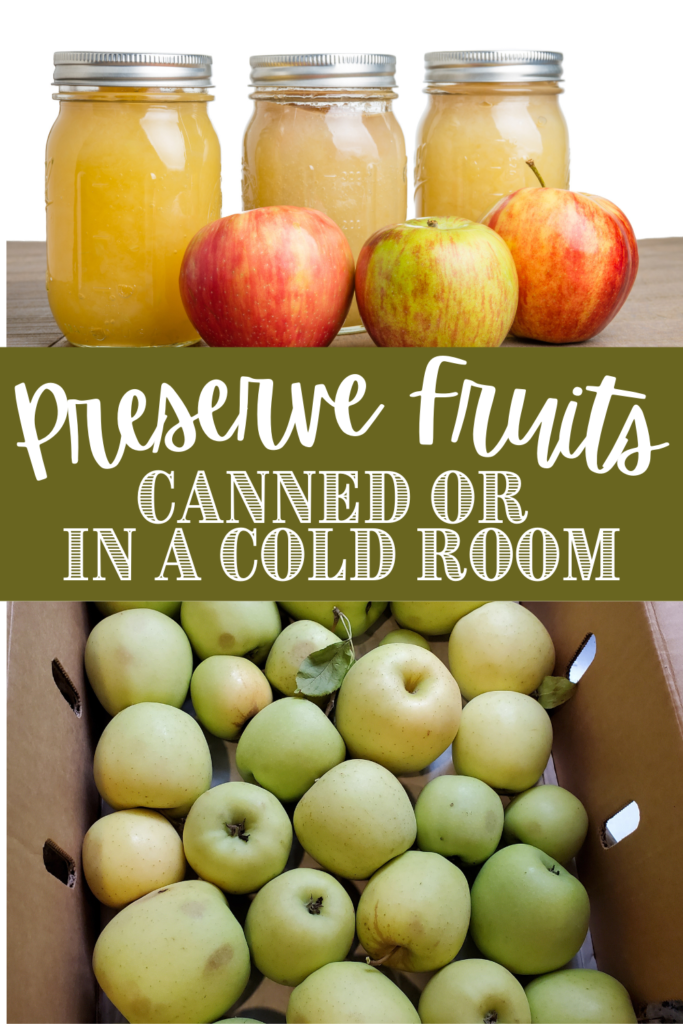
The way you pack and store these fruits and vegetables makes a big difference in how long they last! Going through food storage and removing anything going bad will prevent more loss, and will preserve the other fruits and vegetables longer.
You can also store fruits:
- In The Freezer
- Canned
- Dehydrated
- Freeze Dried
You’ll be surprised how easy it really is to make applesauce and can it in a water bath canner!
Root Vegetables That Store In A Cool Dry Place (Root Cellar)
Root vegetables are awesome because you can store them FRESH in a cool, dark place for MONTHS! This includes all types of potatoes, sweet potatoes, onions, beets, carrots, parsnips, Rutabaga, Turnips, and so on. The best place to store Root Vegetables is in a root cellar, but any COOL, dark place will work. I LOVE the cool room that Shea and her husband built in the basement on the Elliott Homestead! You can build a root cellar in a basement or underground in your yard!
Pumpkins & Winter Squash
Winter squash generally lasts 4-6 months in a root cellar or basement cold room. I believe winter squash are called winter squash because they last through the winter and pilgrims, or pioneers grew them to get their families through those cold sparse months! Winter squash are YUMMY treats baked in the oven, and last MONTHS in a cool dark place! These squash include sugar pumpkins, acorn squash, butternut squash, banana squash, buttercup squash, Carnival Squash, Delicata Squash, and Hubbard Squash Kabocha Squash, spaghetti squash (one of my favorites!) sweet dumpling squash, and Turban squash.
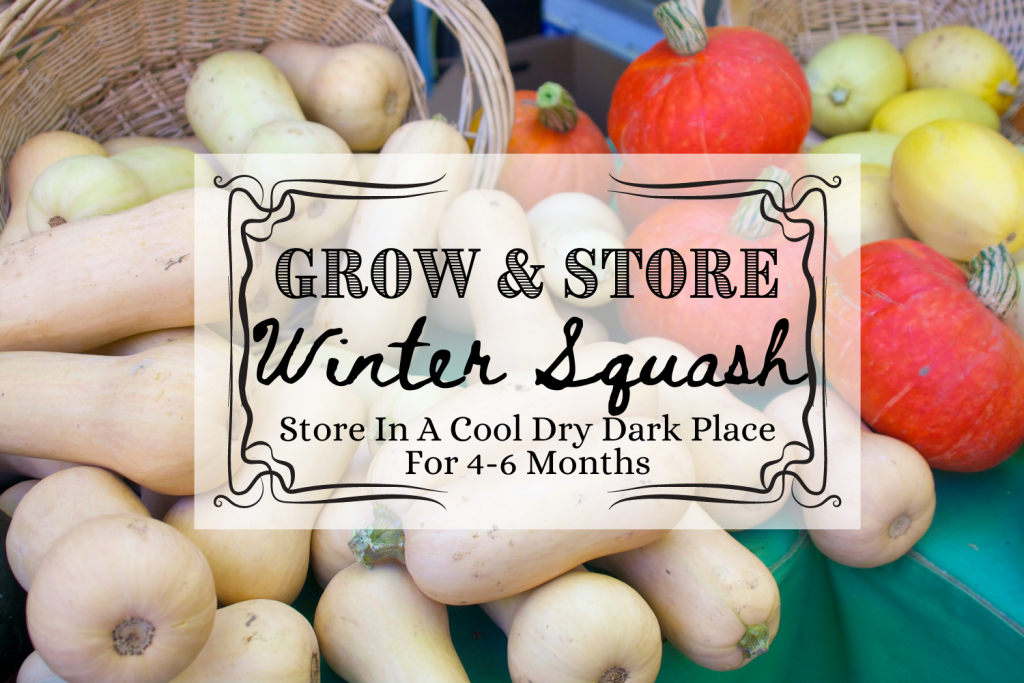
How to store winter squash
One of the best things about winter squash is their long shelf life, as long as you store them right! Store winter squashes in a cool, dry, and well-ventilated place between 45 – 50 degrees!
After cutting into a winter squash, completely cover winter squash tightly with plastic wrap and keep it in the fridge for up to 5 days. Baked and steamed squash can be frozen to use later in soups and stews, as well as casseroles, bread, muffins, and pies.
Freezing Food Storage
Having an extra freezer provides more opportunities to store food for longer-term use! I have an upright freezer in the garage. We used to have a couple of chest freezers, but they are hard to organize and access food from, so I really like the upright because it solves both problems.
I store a ton of food in our freezer, including:
- Freezer Jams
- Frozen Berries
- Frozen Vegetables (Peas, Corn)
- Ground Beef
- Elk Burger & Roasts
- Fish Filets
- Bags of Jerky
- Whole Chickens for roasting and Chicken Breasts
- Garden SEEDS (just in case)
- Butter
- Homemade Pesto
- Soups
- And a few convenience meals from Costco.
Canning
Home canning foods is a great way to store food for a year or more. It takes some work, but nothing is nice than pulling out a jar of homemade, home-canned vegetable beef soup on a busy cold winter day. Just heat it up and you have a ready-made, nourishing meal in minutes!
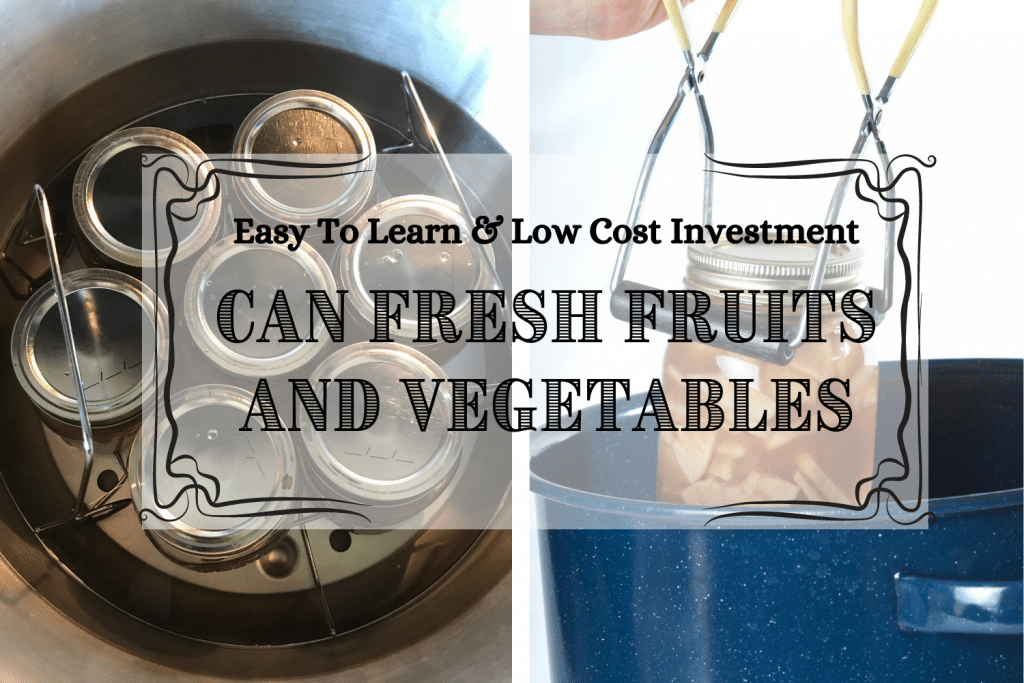
You can bottle or can almost anything, except eggs. There are two ways to can foods, and they must be done correctly in a sanitary way to prevent botulism food poisoning. You can water bath can acidic foods, like fruits, applesauce and peaches crushed tomatoes, and homemade SALSA! But nonacidic foods, like vegetables, BEETS, beef soup or chicken, must be canned in a pressure canner to be safe.
Always make sure to follow reputable sources’ instructions for safe canning recipes and instructions. I like the Ball Preserving Book and the National Center For Home Food Preservation at https://nchfp.uga.edu/ .
Store canned foods in the pantry, basement or root cellar away from heat and direct light.
Freeze Drying Food Storage
Pros: Freeze drying is fun and lasts for years and years… But it is the most time-consuming at this point in time. We bought a Harvest Right freeze dryer, freeze dried batches and batches of fruits, vegetables, and leftovers for a few years, then passed it on to our parents to do the same. You can freeze-dry almost anything… Fatty or oily foods are the only things that cannot be freeze dried!
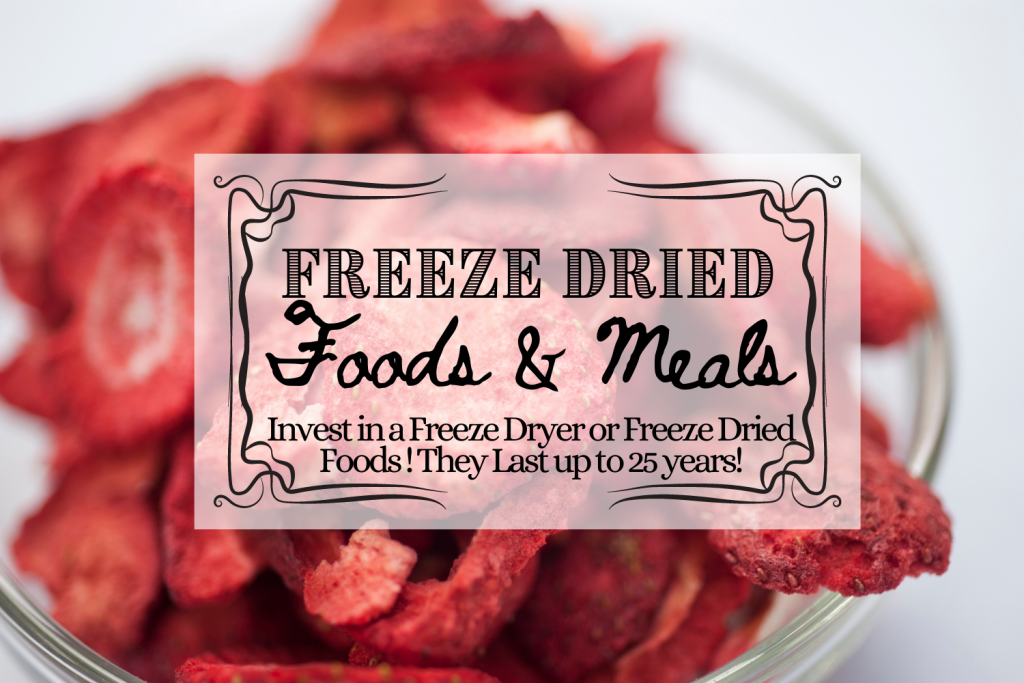
Cons: Besides the fact that freeze dryers are about spendy (about $3000) The only issue with freeze-drying is that it took a couple of days to process a smaller batch of food.
Store freeze dried foods in a sealed mylar bag with oxygen absorbers inside, and they’ll last for up to 25 years! Store filled bags in a cool dry place, in an area where rodents can’t get to it. (Rodents can chew through mylar bags.)
Dehydrating Food Storage
Dehydrating is a great way to store food. I like to dehydrate herbs and spices and keep them in jars! This is great for teas, medicinal herbs and seasonings! My kids also LOVE fruit leather, which we make in the dehydrator. Dehydrated apple or fruit slices are a tasty treat too, and get eaten up quickly! You can also use the dehydrator to make jerky to store protein, or for a yummy treat.
Store dehydrated foods in mason jars, mylar bags, or air-tight storage containers. Dehydrated foods last for about a year. You can also put dehydrated foods in the freezer for longer storage!
I hope this helps you build up food storage for your family! Food storage is important to our family and something I work on regularly. There is always more to learn and try! Hope this gives you some practical ideas to implement at your home!


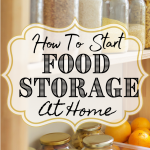





3 comments
Amy
This is such a valuable resource. I think everybody should be more mindful now of preparing for challenging times ahead. I’m busily right now decluttering my basement pantry (which has become sort of a junk-magnet) so I can store food down there. Thanks for all the great tips!
Marissa
I spend a decent amount of time thinking about storing food, but often forget about the importance of water storage, too. Thanks for sharing so much great information!
Julie
I love this. So much great information!